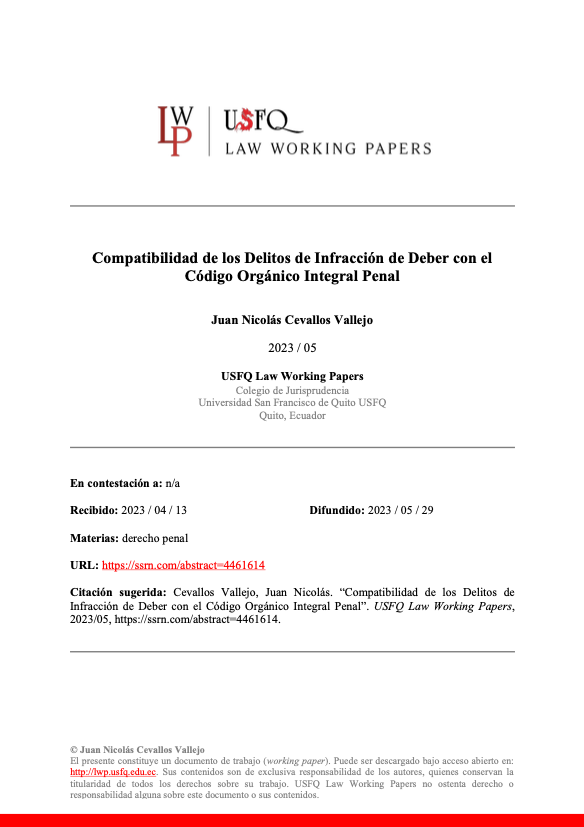Compatibility of Crimes of Duty Infringement with the Organic Integral Criminal Code
DOI:
https://doi.org/10.18272/usfqlwp.126Keywords:
Crimes of duty infringement, perpetrator, joint perpetrator, Organic Criminal CodeAbstract
The objective of this article is to determine the compatibility of the theory of crimes of duty infringement with the concepts of perpetrator and joint perpetrator of the Organic Integral Criminal Code. To specify whether this theory is compatible with the concepts mentioned, a doctrinal study of this theory was carried out, together with an analysis of the concepts that have been invoked, from the dogmatic point of view; and practical, through the examination of the of first instance verdict within the process 17721-2019-00029G. As a result of the study, it has been found that this theory is not compatible with the above concepts. This is because the Ecuadorian criminal law adopts a restrictive concept of perpetrator and joint perpetrator based on the theory of mastery of the act. Therefore, the application of the theory of crimes of duty infringement supposes a transgression of the principles of legality and typicity.
References
Alberto Suárez Sánchez, “Premisas metodológicas y axiológicas para la elaboración del concepto material de autor en el Código Penal Colombiano”, Derecho Penal y Criminología 22 (2001).
Causa No. 17721-2019-00029G, Corte Nacional de Justicia, Sala Especializada de lo Penal, Penal Militar, Penal Policial y Tránsito, 26 de abril de 2020.
Claus Roxin, Derecho Penal Parte General Tomo II (Madrid: CIVITAS, 2014).
Claus Roxin, Autoría y Dominio del Hecho en Derecho Penal (Madrid: Marcial Pons, 2016).
Código Orgánico Integral Penal, [COIP], R.O. Suplemento 180 de 10 de febrero de 2014, reformado por última vez R.O. N/D de 28 de enero de 2022.
Constitución de la República del Ecuador, R.O. 449, 20 de octubre de 2008, reformada por última vez R.O. N/D de 25 de enero de 2021.
Convención de las Naciones Unidas contra la Corrupción, Nueva York, 31 de octubre de 2003, ratificada por el Ecuador el 15 de septiembre de 2005.
Ernesto Albán Gómez, Manual de Derecho Penal Ecuatoriano Parte General (Quito: Ediciones Legales, 2018).
Felipe Rodríguez Moreno, Curso de Derecho Penal Parte General Tomo II Teoría del Delito (Quito: Editorial Cevallos, 2019).
Francisco Muñoz Conde, Introducción al Derecho Penal (Buenos Aires: B de F, 2007). Ley Orgánica de Servicio Público, [LOSEP]. R.O. Suplemento 294 de 6 de octubre de 2010, reformado por última vez R.O. N/D de 1 de septiembre de 2022.
Rafael H. Chanjan Documet, “El correcto funcionamiento de la administración pública: fundamento de incriminación de los delitos vinculados a la corrupción pública”, Derecho Penal y Criminología 38 (2017).
Ramiro Salinas Siccha, Delitos de corrupción de funcionarios (Lima: Palestra, 2021).
Víctor Gómez Martín, Los Delitos Especiales (Buenos Aires: 2006).
William F. Torres Tópaga, “Autoría en los delitos de infracción de deber”, Derecho Penal y Criminología 26 (2005).

Posted
License
Copyright (c) 2023 Juan Nicolás Cevallos Vallejo

This work is licensed under a Creative Commons Attribution-NonCommercial 4.0 International License.
